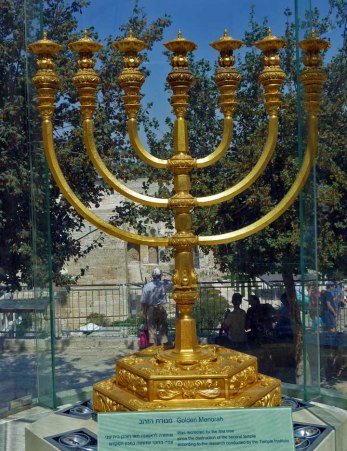 This week’s Torah portion is Vayikra (Leviticus 1:1 – 5:26). Vayikra is essentially one long discourse on animal sacrifice with an occasional grain or oil offering included. This killing of animals, their subsequent burning and the shared eating of their flesh was the predominate way deities were worshipped in ancient Canaan. It was believed that the smell of cooking meat appeased the gods and most importantly stifled their anger. It is no wonder then that the ancient Israelites so integrated within the surrounding culture adopted similar methods of worship.
This week’s Torah portion is Vayikra (Leviticus 1:1 – 5:26). Vayikra is essentially one long discourse on animal sacrifice with an occasional grain or oil offering included. This killing of animals, their subsequent burning and the shared eating of their flesh was the predominate way deities were worshipped in ancient Canaan. It was believed that the smell of cooking meat appeased the gods and most importantly stifled their anger. It is no wonder then that the ancient Israelites so integrated within the surrounding culture adopted similar methods of worship.
Yet, there was always present within Israelite society a minority opinion that the deity didn’t desire sacrifice. The prophets, who strived to create the most just society possible, often said that sacrifice had little effect. Sometimes they even suggested that the divine has never requested sacrifices, such as in Jeremiah 7:22 which says, “For neither did I speak with your forefathers nor did I command them on the day I brought them out of the land of Egypt, concerning a burnt offering or a sacrifice.” Yet, most of the time, the prophets argue that what is most important is how one behaves and the type of society the Israelites create more so than the offering of sacrifices. Prime examples of this line of thinking are the prophet Amos (5:14-15 and 21-24), Isaiah (1:11-17 and 27), Hosea (6:6), Micah (6:6-8) and Jeremiah (6:20).
Clearly, these prophets were uncomfortable with the practice of animal sacrifice, especially when it ignored larger justice issues within the community. When the Romans destroyed the temple in 70 CE and temple worship was no longer possible, thanks to the prophets and scribes, the religion had a tradition to fall back onto rather than die out. Prayer three times a day replaced the three daily sacrificial offerings and the synagogue as a place of gathering, prayer and study replaced the temple.
Some almost two thousand years have past and yet there are some Jews who still long for the days of the temple. They actually want the temple rebuilt so that animal sacrifice can again become the major focus of Jewish worship. Enter the Temple Institute, a small minority of Jews preparing for the temple’s return. They say in their “Statement of Principles” that the reconstruction of the temple is important because there are 202 commandments that cannot be followed today because the temple doesn’t stand. In addition, the ‘normal’ practice of Judaism requires temple worship. In other words, the Judaism we practice now isn’t how it was supposed to be. The temple would also be a place where we could connect more with the divine since the divine presence would dwell there. Finally, the rebuilding of the temple would bring about a time of “peace and harmony.”

They are serious. They have a headquarters in Jerusalem and have replicated items for use in temple worship. They actively seek out a red heifer. They find the rules about Jews visiting the temple mount “restrictive” and “compromising.” They however are vague as to whether or not the messiah must come first in order to rebuild the temple or if it is up to normal everyday Jews to do all in their power to rebuild it before the messiah can, but seem to prefer the latter. In other words, they think a new temple would bring a type of redemption.
I wholeheartedly disagree! First of all, to build the temple again would mean destroying the Dome of the Rock and the Al-Aqsa Mosque, important places in the Islamic tradition. This is not redemptive. Rather, it is wrong. Redemption also would not come from animal sacrifices, as we would be inflicting suffering and misery on animals, using them for our needs and our ends. Third, redemption would not come from the creation of a class of temple priests, as inequality would separate those who benefit from the temple’s existence and those who are constantly and perhaps literally indebted to its services. Fourth, redemption would not come from another male-only run institution, as women would once again only be behind the scenes or have roles that support of the male-only priesthood. Fifth, redemption would not come from the devaluation of the synagogue and the leadership of the rabbi, as prayer and study would be replaced by sacrifices.
In other words, I don’t want another temple because it would only increase sexism, inequality and the suffering of animals while, at the same time, destroying Islamic holy sites and fundamentally altering Jewish tradition. And, while I understand why a parshah like Vayikra exists (we did once have a temple and temple worship was important for the ancient Israelites), we should not rebuild the temple. It would not bring more of the divine into the world nor bring us closer to the divine.
Rather, the message of the prophets rings considerably more redemptive. In practicing justice, the love of kindness and care for the widow, orphan and refugee as well as bringing salvation for the oppressed and instilling peace, we not only walk with the divine, but we also bring more of the divine into the world. This will create a redeemed world. No temple required.
Ivy Helman, Ph.D.: A feminist scholar and faculty member at Charles University and Anglo-American University in Prague, Czech Republic where she teaches a variety of Jewish Studies, Feminist and Ecofeminist courses.


I agree with you in preferring the prophets’ views on animal sacrifice, but I do not agree with their condemnation of those who worship “on every high hill and under every green tree.” Why shouldn’t they have? Why shouldn’t we? The prophets also said that infants would be ripped from their mother’s wombs and children dashed to pieces to appease God’s anger. Let us be clear that defenders of the prophets as having had a higher vision must pick and choose their passages from the prophets.
The idea that sacrifice was adopted from the Canaanites and therefore not part of “true” Israelite religion was challenged by Morton Smith a long time ago: “Morton Smith argued for the essential similarity of ancient Israelite religion with all other ancient religions of the Mediterranean area. He saw ancient Israelite religion, like ancient Mesopotamian religion, as being based on that sort of contractual . . .relationship between man and god that is generally classified as “polytheism” or even magic.” Moreover, he argued that similarities between ancient Israelite and other ancient Mediterranean religions are not necessarily evidence for cultural borrowings from Mesopotamia or survivals of Canaanite religion.” https://www.andrews.edu/library/car/cardigital/Periodicals/AUSS/2006-1/2006-1-02.pdf
LikeLike
Reblogged this on spiritandanimal.wordpress.com.
LikeLike
Interesting piece, Ivy. I grew up with evangelical missionary parents (Argentina) who understood that the “Lord’s return” could not happen, and many conservative Christians long for Jesus’ return, until the temple in Jerusalem had been rebuilt and started to function again is in days gone by–before the temple destruction of 70 C.E. “The New Yorker” had a piece some time ago titled “Forcing the End” (1998) about the “necessity” (according to evangelical Christians) of rebuilding the temple.
Here is an excerpt: “There are about a thousand active supporters of the most radical Temple Mount movements in Israel today, but religious conservatism is on the rise due to the apocalyptic vision that was unleashed by the Israeli victory in the Six-Day War. An unexpected alliance has formed between Evangelical Christians and Jews due to their shared interest in rebuilding the Temple. The writer interviewed Rev. Jerry Falwell about the significance of the Temple to Christians. Many Christians who are helping Israel today are doing so to facilitate the moment when they believe they will be raptured into Heaven.”
Part of our bent in the US today rests on the narrative (mythology in the classical sense) of Jews returning to what is now Israel (since 1948) and getting things in order for the Second Coming–including the red heifer. Our myths inform us and I think one of the reasons the US is so supportive of Israel is that evangelical Christians have shaped a large part of the narrative and people in the US have absorbed it. It’s how myths work.
The full article is available on the web.
LikeLiked by 1 person
Ivy, I agree with you that Jews don’t need to be building a new temple in which they can kill animals. I don’t believe anything those old men said, especially the one (Hosea?) who compared the Israelites to a whoring wife. Nor am I interested in the god they were preaching about.
Esther, thanks for the additional information you gave about the temple people.
Brava to both of you!
LikeLiked by 1 person
“No Temple Required” What an excellent title! I am saddened that there is a whole movement out there trying to turn back time to the tune of thousands of years.
The concept of sacrifice is a pretty fascinating one, however. It involves the root of “to make sacred” so it does seem to have some power. But it does beg the question about what sacrifice is. My favorite definition comes from Rabbi Gershon Winkler in his book “The Way of The Boundary Crosser” (page 19) in his translation of Psalm 50:14: “Sacrifice to God by being thankful.”
Thanks for a thought provoking article and evaluation.
LikeLike
I totally agree with you Ivy and find the literalism that these folk are promoting in insisting on rebuilding the Temple quite scary – what next, stoning people?
How much easier to use all one’s resources to think about rebuilding some building we don’t need than to deal with injustice and poverty where see it every day.
Isaiah says: “…Loose the bonds of injustice…undo the thongs of the yoke…let the oppressed go free…share your bread with the hungry.” Is 58: 5-9
LikeLike
Thank you, Ivy Helman, for sharing your beautiful Menorah tree image here at FAR. So nice to see all those gorgeous, real life trees in the background too — WOW!
LikeLiked by 1 person